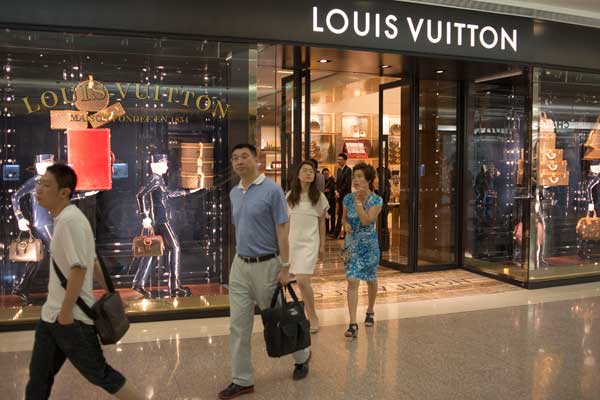

Luxury appraisal courses gain favor among the wealthy as counterfeit goods become harder to distinguish, Xu Junqian in Shanghai reports.
The record summer heat left Shanghai's famed Tianzifang, an alley usually crowded with tourists and sightseers during the weekend, nearly deserted on a recent scorching day. One or two residents in slippers and pajamas took advantage of the rare quiet to chat with their neighbors in the passageway. Crowds of busy tourists, appearing and disappearing as fast as summer showers, took some snapshots of the "must-see sight" listed by almost every tour guide, then quickly rushed into the air-conditioned mall across the street.
 |
|
Even in shopping malls, sales staff will replace authentic goods with high-quality fakes, according to Lin Li, a 22-year-old college student, who attended a luxury appraisal class in Shanghai. [Dave Tacon / for China Daily] |
But in a three-floor industrial-style loft building tucked deep in one of the alleys, which on weekdays houses art galleries and fashion designers who have their stores nearby, the summer heat gave way to something more "serious".
It was the first luxury appraisal class held in the city, perhaps even the whole country.
The three-hour course, held on a Saturday afternoon when the temperature crossed 40 C, was organized by Fashiontrenddigest.com, a Chinese fashion-industry trade journal. It charged 200 yuan ($32.70) a person for what the organizers called "the elementary-level course" to distinguish authentic luxury products from the fake.
"The first day that enrollment was announced, the class was filled," said Ye Qizheng, the co-founder and editor-in-chief of the website.
The original plan was to admit about 20 people, a number Ye said usually took weeks to achieve for earlier courses such as fashion trend prediction. But for the luxury appraisal class, more than 40 people called and mailed "from all over China" on the first day, forcing Ye and his team to take the notice off their website.
"I browsed 50 pages of Google searches to find a course of this kind. I was thrilled to learn (there is) one taking place in Shanghai," said 28-year-old Yang Yijing, who traveled with her boyfriend all the way from the Ningxia Hui autonomous region for the course.
Yang, the daughter of a local well-off car dealer, said she had been wanting to "do some business involving secondhand luxury goods" after returning from Milan, Italy, where she finished graduate studies in luxury management in 2012.
As she found that what she'd learned overseas had little practical use in her hometown, where "luxury needs little management but only a presence", she decided to focus on something more novel but also potentially profitable — selling expensive cast-offs, or in Yang's words, "vintage luxury".
As she said, "the first thing I need to learn is telling the real from the fake, and it's something you can only learn in Asia, where fakes are produced."
Yang's needs seem to be well-catered for in the course.
Li Na, the 33-year-old lecturer, is a professional luxury appraiser who has been working in secondhand luxury stores in Japan for a decade.
"Louis Vuitton items produced before and after 2006 have different ‘birth certificates'," Li told the class. That's just one thing she's learned in the past 10 years in the industry.
Sitting in front of her were some of the country's richest and least busy women (and a few men), who bore bags with the logos of Louis Vuitton, Chanel and Dior. They paid rapt attention, even when the air-conditioner stopped working in the middle of the lecture.
"Two-thirds of the people came only to learn, with a simple thirst for knowledge," said Ye, the organizer. "As more and more people are buying luxuries, the wealthy want to distinguish themselves with limited editions and vintage luxury items.
"Stuff of this kind is not easily found in official stores, and the risks of getting knock-offs are high."
Lin Li, a 22-year-old Shanghai college student, who came to the class alone, agreed. Despite being rather coy about her parents' professions, Lin said she traveled at least three times a year overseas to do luxury shopping.
"I have been told that even in domestic shopping malls, the sales staff will replace the real goods with what they call ‘high-resolution replicas'," as she put it.
Li, the appraiser, told another side of the story. She noted that although she now lives and works in Japan, she has to travel frequently back to China, to "go deep into" counterfeit manufacturing sites in Shenzhen and Guangzhou to keep up to date with the highly volatile industry.
Once, she was offered 1 million yuan by a counterfeit factory to be "the technological counselor".
 Highlights of CIAPE 2013
Highlights of CIAPE 2013
 2013 China International Auto Parts Expo kicks off in Beijing
2013 China International Auto Parts Expo kicks off in Beijing
 Tesla, electric, hybrid cars at Frankfurt 2013 Motor Show
Tesla, electric, hybrid cars at Frankfurt 2013 Motor Show
 Supercars at Frankfurt 2013 Motor Show
Supercars at Frankfurt 2013 Motor Show
 Cars, models at Frankfurt 2013 Motor Show
Cars, models at Frankfurt 2013 Motor Show
 Concept cars at Frankfurt 2013 motor show
Concept cars at Frankfurt 2013 motor show
 Premier Li meets entrepreneurs, answers questions
Premier Li meets entrepreneurs, answers questions
 Premier stresses education equality
Premier stresses education equality